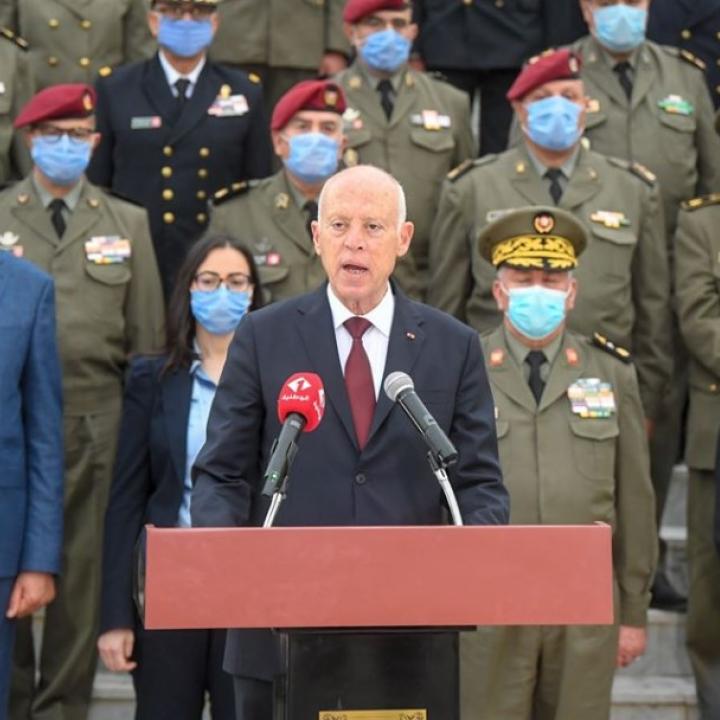
- Policy Analysis
- Fikra Forum
How Tunisia’s COVID Response Demonstrates Governmental Dysfunction

With a fragile democratic transition process and a continuous low-intensity yet bloody conflict against terrorist groups, Tunisia is still taking stock of the effects and repercussions of the COVID-19 pandemic on the country. The pandemic hit at a time of political struggle and economic uncertainty. As such, the government’s response to the pandemic highlights the limits to its ability to manage the crisis, while demonstrating signs of falling back on the policies implemented in Tunisia when dictator Ben Ali held power.
Between Denial and Repression
The first official reaction to the alarming news coming out of China and Europe was a total denial and underestimation of the threat, which felt reminiscent of earlier government responses to crises such as the 2002 Al-Ghriba synagogue terrorist attack or the 2005 crash of Tuninter flight 1153. In early February, and despite several calls to control visitors, the Tunisian government was slow to take preventive measures.
With the first official case was declared on March 2, travel limitations to Italy—the suspected origin point of the first cases—were announced a week later. Yet local authorities tried to keep open the most important transport lines, especially with France and Libya. Commentators attributed a hotspot in the southern region of Kebili to smuggling activities in that area between Libya, Tunisia, and Algeria.
The reaction of the government only effectively began to take place during the mid-March period, and though daily press conferences kept Tunisians better informed, policies implemented were again reminiscent of those of the pre-2011 regime. Despite the institutionalized National Countering Disasters Committee (NCDC), ministries were working separately with a dangerous lack of coordination and absence of operational headquarter or a national emergency information system. The government issued contradictory civil orders that led to confusion and often chaos.
The best example was the announcement of financial aid program that forced thousands of citizens to go to local post offices despite the previous announcement of social distancing measures and a curfew. Following that episode, the minister of health made an emotional statement claiming that all the gains made by his ministry’s efforts were lost. The pandemic also disclosed tensions among the president’s team of advisers. Local press speculates that the national security adviser General Hamdi resigned due to pressure from N. Akacha, the chief of staff of the presidency.
Meanwhile, the police implemented an oppressive series of measures, restricting travel and imposing new fines without providing adequate services or clear procedures to the public. Many saw these police efforts as targeting individual rights and even free speech. These efforts could also be seen in the legislature: representative M. Kourshid introduced a vaguely formulated law proposal designed to impose arbitrary restrictions to bloggers and local media—the vigorous reaction of civil society organizations forced its withdrawal.
The official narrative highlighted its freshly acquired surveillance gadgets like a locally made patrol robot or Chinese drones. The latter will be used to control not only civilians but also military personnel inside their barracks according to the Tunisian health minister. Prime minister Fakhfakh who received special power delegation from the parliament—also announced that the government used cell phone personal data during the pandemic, which rouse real concerns about the authoritarian drift in Tunisia.
Meanwhile, state media contributed to the general press amplification of the Chinese version of facts, including the reiteration of complex conspiracy theories based on conflicting unverified information. In Tunisia, the press highlighted the image of the PRC as the savior of the world while accusing the United States of manufacturing the virus and stealing medical supplies destined to Tunisia. Local civil society organizations felt the need to counteract this narrative, including with the creation of a website called ‘’Falso’’ designed to fight fake news.
Tunisia’s Economic Struggles
Now, the government is faced with the challenging task of mounting an efficient response to the free-fall of economic indicators in Tunisia in the wake of its response to the pandemic. Tunisia’s GDP has decreased over a quarter since 2014, along with the devaluation of the national currency (the Tunisian Dinar TND) and the country’s high level of unemployment.
Official efforts have been mainly funded by a cut in the salaries of public sector employees. These cuts already contributed the majority of tax revenues that make up the bulk of the state’s budget. The authorities also issued a nationwide call for donations to a freshly created fund intended to set up ad hoc healthcare operations, though local journalists have suggested that the fund will likely suffer from opaque management in the style of the defunct 26-26 solidarity fund created by former president Ben Ali, officially designed to combat poverty in Tunisia.
Meanwhile, the economic struggles have meant that the healthcare system has not been prioritized; the ministry of health's budget has significantly decreased over the last decade. Several public hospitals were de facto managed by labor unions that prioritize political and factional claims in total disregard of the government’s decisions, with latter proving unable even to enforce its decisions in key public health facilities. Outside of public hospitals, the 24 teaching hospitals (Centre Hospitalo-Universitaire, CHU), and 90 private clinics are all located in the coastal cities, leaving the majority of the population practically uncovered.
As a second wave of cases begins to hit the region, Tunisia must face the failures of its response to the first wave and the economic fallout that is crippling the country. This healthcare crisis veered to a political and social crisis that exposed a dysfunctional political system, with the majority of Tunisians now facing precarious conditions. It has also served as the trigger of an all-out conflict between Nahdha party and its allies and president Said, who asserted the need to change the political system writ large. Until reforms are implemented, it is clear that the government will likely mishandle future crises, as regular Tunisians continue to suffer.


